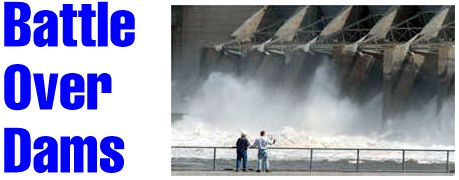forum
library
tutorial
contact

Congress Members Put Salmon in Spotlight
by Mike LeeTri-City Herald, August 5, 1999
|
the film forum library tutorial contact |

|
Congress Members Put Salmon in Spotlightby Mike LeeTri-City Herald, August 5, 1999 |

The plight of the Snake River salmon jumped into the national political spotlight Wednesday, when 107 members of Congress urged President Clinton not to overlook dam breaching as a way to reverse Northwest salmon declines.
"It establishes a new political center of gravity on this issue," said Ralph DeGennaro, executive director of Taxpayers for Common Sense, a Washington, D.C., budget watchdog group that coordinated the letter.
"I think for months the only voices have been those in Congress who already have their minds made up," he said. "There is now a national chorus of voices with a more centrist and balanced message."
Environmental groups hailed the announcement as a blow against those trying to turn discussions away from dam breaching before the release of two key federal agency recommendations on fish recovery.
"Congress believes that facts, not politics, should decide the fate of the Snake River salmon," said Justin Hayes, a spokesman for American Rivers, a national river conservation group.
Late last month, Rep. Doc Hastings, R-Wash., pushed a resolution through the House Resources Committee opposing dam removal and seeking to turn discussion toward predators, harvest and ocean conditions.
Some Northwest representatives warned that Hastings' resolution could prompt more action from national environmental groups and invite politicians from outside the region to take a whack at the Northwest's enviable energy rates.
Led by Thomas Petri, R-Wis., and George Miller, D-Calif., politicians from 21 states said in their letter to Clinton that, "Without prompt and impartial consideration of all scientifically credible alternatives, ... we risk both the loss of money and the nation's resource."
Six Democratic representatives from the Northwest signed the letter, including Jay Inslee and Jim McDermott from Washington and David Wu, Peter DeFazio, Darlene Hooley and Earl Blumenauer from Oregon.
Of the 107 signers, 12 were Republicans. Two of them, both from California, were from Western states.
They urged the president to look for "scientifically credible" salmon recovery options and asked him to oppose any attempt by politicians to "circumvent relevant laws" or postpone a decision on Snake salmon recovery.
While avoiding an endorsement of dam breaching, the letter signals that a large national contingent is closely watching Snake salmon recovery and wants to make sure taxpayers aren't left holding the bag. The letter reminds Clinton that Congress has treaty obligations with American Indians and Canada that require strong salmon runs.
Taxpayers for Common Sense joined with environmental groups nationwide to convince members of Congress to sign the letter. "It was always a national issue because everybody's money was on the line," DeGennaro said. "This letter shows the rest of the nation is waking up to that."
It also shows the debate about dams is reaching a critical stage. A multiyear, $20 million study of salmon recovery options by the Army Corps of Engineers on the Snake River is due this year, and the National Marine Fisheries Service is in the middle of devising its Columbia Basin salmon-protection program for the next several years.
One of the options is to breach the four lower Snake River dams, built in the 1960s and 1970s between Pasco and Lewiston. One major federal study found dam breaching had the best chance of restoring salmon on the Snake.
That study was heavily debated and discounted by irrigation and port interests who fear the removal of the Snake River dams will mean economic distress for the rural Northwest without creating strong salmon runs.
learn more on topics covered in the film
see the video
read the script
learn the songs
discussion forum
